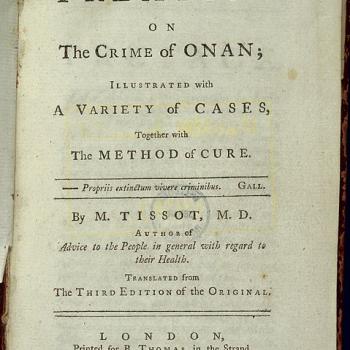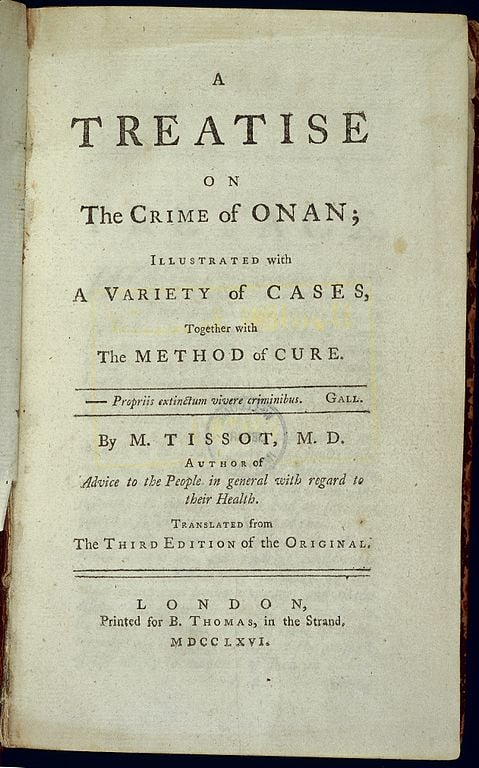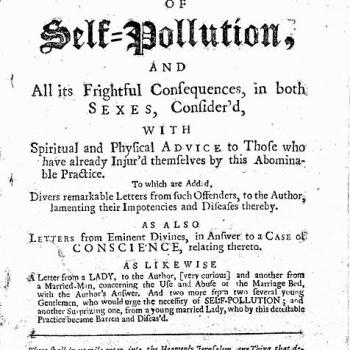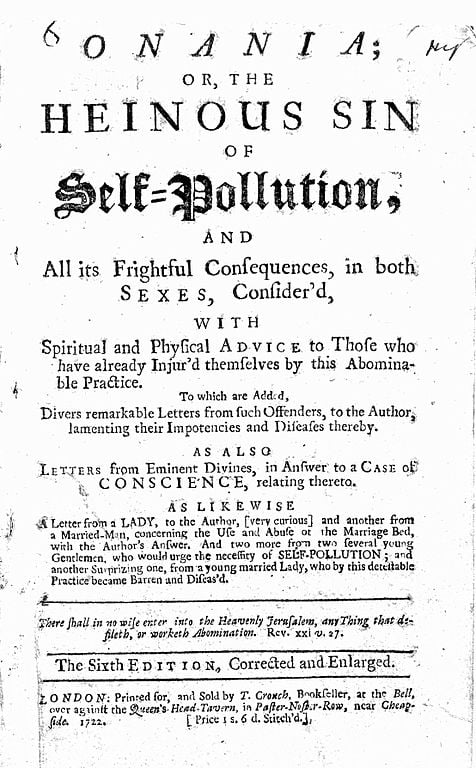Steve Hays is a very active Protestant anti-Catholic polemicist. He runs a site called Triablogue.
* * *
His words will be in blue. Comments of others besides myself will be in green, and my words cited are in purple. As everyone knows, I normally don’t try (for various reasons) to dialogue with anti-Catholics, anymore, as a matter of policy (I decided this after ten full years of hair-pulling futility). But Steve’s statements on this topic were so outrageous that I felt compelled to comment on his blog, and then, sure enough, it became a little “exchange” (at least Steve has the courage of his convictions, unlike virtually all other anti-Catholics I have encountered). So be it. I will always call sin sin, when it is necessary.
* * *
I didn’t say I approve of masturbation. I don’t approve or disapprove. From what I can tell, Scripture is silent on the issue, so I’m not going to condemn something as sin unless it falls under the condemnation of Scripture.
That doesn’t mean I commend it. It means that I have no firm opinion one way or the other.
2. What I do object to is an extrascriptural scrupulosity that is stricter than the Bible itself.
. . . There’s a question of how to interpret the apparent silence of Scripture on the subject of masturbation. On the one hand, Scripture is very specific and even explicit about naming sexual sins. On the other hand, masturbation is extremely prevalent.
If masturbation is a sin, then it’s a little odd that Scripture would leave the believer guessing about its moral status.
. . . At the risk of stating the obvious, the lack of an erotic outlet for single men in their sexual prime is, itself, a source of lust and sexual tension. In that context, masturbation is a way of releasing the pent up, psychological preoccupation with sex.
This may be good or bad, but if we’re going to frame the morality of the act in terms of lust, we need to keep in mind that the objection to masturbation as lustful actually cuts both ways.
At the risk of stating the obvious, how do we teach our kids about sex (whether homeschooling or private Christian education) without visuals of one sort of another? Since premarital sex is illicit, the only licit alternative is either diagrams or an active sexual imagination.
(2 January 2007)
I’m not proposing that masturbation is a substitute for marriage. The question, rather, is whether it’s a sexual safety value for singles – especially younger men (once again, I don’t presume to speak for women).
“Masturbation is inherently self-centered.”
You might as well say that eating an ice cream cone is inherently self-centered.
But, then, maybe you think that ice cream is intrinsically evil.
. . . I’m not going to guilt-trip Christians for doing something that isn’t condemned in Scripture – as far as I can see.
Both in Catholicism and certain legalistic Protestant denominations, there is a tradition of going way beyond Scripture to amend the Decalogue with a string of additional “Thou shalt nots” that you can’t find in Scripture.
. . . JimmyV said:
“Instead of relying on Steve and his ‘wisdom’ gained over the past 40 years, let’s use the 2,000 year history of our Church.”
1. Which church would that be?
2. What about using 3500 years of Biblical wisdom instead?
3. Are celibate clergy experts on sex?
“The deliberate use of the sexual faculty, for whatever reason, outside of marriage is essentially contrary to its purpose.”
The deliberate use of the nose and ears as a platform for glasses is essentially contrary to their auditory, olfactory, or respiratory purposes.
“To form an equitable judgement about the subject’s moral responsibility, one must take into account the affective immaturity, force of acquired habit, conditions of anxiety, or other psychological or social factors that can lessen, if not even reduce to a minimum, moral culpability.”
So a 5-year-old who wears glasses is not as culpable as a 25-year-old.
What about the use of the lips and lungs to play a trumpet in order to derive musical pleasure? Is that a venial or mortal sin?
(3 January 2007)
*
* * * * *
Scripture certainly does condemn masturbation (and contraception by the same token). This is precisely the reason why there was a consensus on both contraception and masturbation among all Christians: Catholic, Protestant, Orthodox, until very recently, when theological liberalism, higher criticism of the Bible, and the sexual revolution, bore their pathetic fruit.
This is why Luther and Calvin both wrote with extreme disdain for Onan and his sin, whereas many of today’s Protestants have a ho-hum or neutral attitude about these grave sins:
Onan must have been a malicious and incorrigible scoundrel. This is a most disgraceful sin. It is far more atrocious than incest and adultery. We call it unchastity, yes, a Sodomitic sin. For Onan goes in to her; that is, he lies with her and copulates, and when it comes to the point of insemination, spills the semen, lest the woman conceive. Surely at such a time the order of nature established by God in procreation should be followed . . . He was inflamed with the basest spite and hatred . . . Consequently, he deserved to be killed by God. He committed an evil deed. Therefore God punished him . . . That worthless fellow . . . preferred polluting himself with a most disgraceful sin to raising up offspring for his brother. (Martin Luther, Lectures on Genesis: Chapters 38-44; 1544; Luther’s Works, VII, 20-21)
It is a horrible thing to pour out seed besides the intercourse of man and woman. Deliberately avoiding the intercourse, so that the seed drops on the ground, is doubly horrible. For this means that one quenches the hope of his family, and kills the son, which could be expected, before he is born . . . Moreover he [Onan] thus has, as much as was in his power, tried to destroy a part of the human race. When a woman in some way drives away the seed out the womb, through aids, then this is rightly seen as an unforgivable crime. (John Calvin, Commentary on Genesis [38])
* * *
I find it equally remarkable that in 32 comments on masturbation and Scripture, not a single mention was made of Onan thus far. Yet his story was understood very widely as dealing with both masturbation and contraception, for many centuries. It’s amazing indeed, but (sadly) not surprising. This is what liberalism brings about. Even otherwise conservative Christians caving in on grave matters of sin such as these. The tide is slowly turning, thank God. I recently noted that some prominent Protestants are re-examining the question of contraception.
“I’m surprised by your neutrality with regard to masturbation and single males. First of all, God created sex to involve two parties, ‘He made them male and female’.”
i) This is a good example of how our reading of Scripture is unconsciously conditioned by extrascriptural assumptions.
Juan defines masturbation as sex. But the Bible doesn’t define masturbation as sex. And the Bible doesn’t define it as sex for the simple reason that the Bible doesn’t discuss masturbation at all.
So his appeal is circular. He classifies a certain behavior as sexual, although the Bible is silent on this specific behavior, and then he plugs that extrabiblical definition into the Biblical framework of sexual sin.
ii) Aside from the above stated circularity, there is also a basic incoherence in his definition. If the Bible defines sex as a two-party transaction, and masturbation is a solo behavior, then, by definition, masturbation wouldn’t qualify as sex.
iii) Juan is half-right. Wherever the Bible talks about either licit or illicit sex, it’s a two-party transaction, whether premarital sex, extramarital sex, marital sex, sodomy, or bestiality.
So, one could agree with his premise, but draw a different conclusion. Since the only forms of sexual sin targeted in Scripture involve two-party transactions, masturbation doesn’t fall under the operating definition.
Again, I’m not saying that masturbation isn’t sex. And I’m not saying that masturbation isn’t wrong.
I’m simply noting that, as of yet, the critics of my noncommittal position aren’t coming up with very good arguments.
Instead, they’re importing extrascriptural assumptions into the text of Scripture, as well as resorting to very slipshod forms of reasoning.
This is well-meaning, but it illustrates the fact that they really haven’t thought through the issues before rushing to judgment.
(“Onanism,” 1-4-07)
I find it equally remarkable that in 32 comments on masturbation and Scripture, not a single mention was made of Onan thus far. Yet his story was understood very widely as dealing with both masturbation and contraception, for many centuries.
As this is a textbook example of why tradition is an unreliable guide to exegesis.
i) In context, Gen 38:8-10 is describing coitus interruptus rather than masturbation. These are hardly equivalent.
Onan was having sex with a woman. That is how he achieved a state of sexual climax.
Is that interchangeable with masturbation? I don’t think so.
I anticipated this response and should have issued a “preemptive strike.” The two are ethically similar if not identical insofar as they both separate ejaculation from its proper sphere (in the context and act of intercourse, open to procreation, which is its deepest ontological purpose). Onan deliberately removed himself from proper sexuality and “interrupted” it with de facto masturbation.
Homosexual sex, or sodomy, is another instance of the same. They are all essentially the same on a moral plane because they deny the divine purpose of sexuality: procreation, and even the accompanying purpose of the unity and oneness of a man and a woman in lovemaking.
Besides, most Protestants are no more opposed to contraception than (many) are to masturbation. You may say this is solely contraception and has no bearing on masturbation at all, but even if one grants that (I don’t, per the above) you still have to explain how the Bible explicitly condemns it and Onan winds up dead. Theories about his failure to do the levirate duty, etc., fall flat with cross-referencing, as I showed, particularly in my longer paper.
So you are in a position of defending a sexual morality that is explicitly condemned in the Bible, in the case of contraception (specifically an old variant of it: coitus interruptus). Any way you slice the cake, the Protestant who has (knowingly or not) caved into the sexual revolution in part, has severe biblical problems to contend with.
Talmudic literature draws a clear distinction between contraception and masturbation
Cf. E. Ullendorff, “The Bawdy Bible,” BSOAS 42 (1979), 425-56.
One may abstractly or conceptually distinguish the two, but it doesn’t follow that:
1) they were not both condemned by the ancient Jews,
or
2) that Genesis 38 has no bearing on masturbation at all.
Fr. Brian Harrison did a huge study on ancient exegesis of Genesis 38: “The Sin of Onan Revisited”. He showed that your overall contention is incorrect and that the Talmud also associated masturbation with the condemnation of Onan:
In the parable of the sower, the idea of seed which falls upon the ground, rather than in it, symbolizes a fundamental sin: rejection of the Word of God (cf. Lk. 8: 5-6, 12-13). In Hebrew poetic thought a woman’s body in its capacity for fruitfulness and motherhood is sometimes alluded to under images of a “garden” in which seed is to be sown (cf. Song of Songs 4: 12-16; 5: 1; 6: 1-2). Indeed, the very fact that in Hebrew the same word (zerah) is used for both ‘semen’ and ‘seed’ suggests that the potential for fruitfulness is understood as essential to any sexual activity.”
“The Encylopedia Judaica (Vol. 4, p. 1054, article “Birth Control”) states: “Jewish tradition ascribed the practice of birth control to the depraved humanity before Noah (Gen. R. 23: 2, 4; Rashi to Gen. 4: 19, 23).” (For further confirmation of Jewish views on this point, cf. H. Hirsch Cohen, The Drunkenness of Noah [University of Alabama Press].) The Encylopedia article adds that on the basis of Gen. 38: 9-10, “the Talmud sternly inveighs against ‘bringing forth the seed in vain’, considering it a cardinal sin (Nid. 13a). . . . Strictly Orthodox [Jews], . . . for religious reasons, refuse to resort to birth control.” In the same Encyclopedia, under “Onanism” (Vol. 12, p. 1495), it is stated that the act of Onan “is taken . . . by the Talmud (Yev. 34b) to refer either to unnatural intercourse or (cf. Nid. 13a) to masturbation. The Zohar [a 13th century work] expatiates on the evil of onanism in the second sense.” Other works by Jewish authors corroborating this tradition include D. Feldman, Marital Relations, Birth Control and Abortion in Jewish Law (New York: Schocken Books, 1974) and J. Cohen, ‘Be Fertile, Increase, Fill the Earth and Master It’ (Cornell University Press, 1989).
Fr. Harrison summarized:
The classical Jewish commentators – who can scarcely be accused of ignorance regarding Hebrew language, customs, law, and biblical literary genres – certainly saw in this passage of Scripture a condemnation of both unnatural intercourse and masturbation as such. A typical traditional Jewish commentary puts it thus: “[Onan] misused the organs God gave him for propagating the race to unnaturally satisfy his own lust, and he was therefore deserving of death.” And this is undoubtedly in accord with the natural impression which most unprejudiced readers will draw from the text of Genesis 38.
So it’s Armstrong’s interpretation which is anachronistic.
Hardly, as just shown. Moreover, Joseph Schenker is the Professor and Chairman of the Department Of Obstetrics and Gynaecology, Hadassah, University Medical Centre, Jerusalem, Israel, wrote:
The collection of semen can present problems because of the prohibition against masturbation and “seed wasting”. Masturbation is strictly condemned by the rabbinical sources: “Thou should not commit adultery, neither by hand, nor by foot”. Coitus interruptus, or withdrawal, and the use of condoms are generally prohibited on the basis of the Biblical injunction against “spilling of the seed needlessly”.
See the texts in the Babylonian Talmud itself: Niddah 13a / 13b.
iii) He also rips the verse out of context in another way:
“It refers to the levirate law of antiquity (the Latin levir means ‘a husband’s brother’) . . . Here and elsewhere (Deut 25:6; Ruth 4:10) it is for the preservation of the dead brother’s name and family. In addition, the law is one of inheritance so that the dead mans’ property will remain in the extended family. Finally, it is for the protection of the widow so that she should not have to sell herself for debt or have to marry outside the clan,” J. Currid, Genesis (Evangelical Press 2003), 2:209.
“Onan apparently does not want to father a son who will prevent him from receiving his deceased brother’s inheritance,” V. Hamilton, The Book of Genesis: Chapters 18-50 (Eerdmans 1995), 436.
“Onan’s refusal is explained by his knowledge that the son will not be his (38:9). We need to recognize, then, that there is a birthright issue here. Er was the firstborn and entitled to the birthright. If he has no offspring, the birthright will transfer to Onan. If, however, Tamar bears a son that is considered Er’s, the birthright will pass to that son. We can therefore conclude that Onan is punished by death for preserving his inheritance rights by disposing of the competition,” J. Walton, Genesis (Zondervan 2001), 668.
Not at all. I already dealt with the “comeback” of appealing to the levirate law, in both my short and long articles. Here is my response in the shorter one, which is actually a chapter in my soon-to-be-published book, called The One-Minute Apologist:
This involved what is known as the “levirate law”: the duty to produce offspring with the wife of a dead brother. But this is not why God killed Onan, since the penalty for that was public humiliation and shunning, not death (Dt. 25:5-10). Context also supports this interpretation, since immediately after this (Gen. 38:11-26), is the story of Onan’s father Judah refusing to enforce the law and allow his other son, Shelah to produce a child with Tamar, his daughter-in-law. He was afraid that Shelah would be killed like Onan and his other wicked son, Er (38:7,11). Judah acknowledges his sin in 38:26: “She is more righteous than I, inasmuch as I did not give her to my son Shelah.” He wasn’t killed, so it is unreasonable to contend that Onan was judged and killed by God for the very same sin that Judah committed (in the same passage). Onan was judged for contraception (sex with the deliberate intent to unnaturally prevent procreation).
Does Catholic moral theology endorse bigamy? Does it sanction a married man cohabiting with his sister-in-law to keep the property in the family?
If not, why is Armstrong appealing to the tribal custom describe in Genesis 38:8-10? It either proves too much or too little for his own purposes.
To the contrary, Onan was not killed for violating this law (nor was anyone else), but for the sin of contraception, which is essentially similar to the sin of masturbation. You are the one who is out to sea here in your exegesis (and your history).
Since the morality of masturbation is debatable, there’s nothing wrong with entertaining doubts.
It only is debatable in modernistic Christianity and biblical interpretation; this is the problem. Fancy that!: Steve Hays: the victim of modernism and liberalism in both sexual morality and hermeneutics. How ironic . . .
Some of our feelings are irrational or unjustified or exaggerated. But that’s the thing about feelings.
It’s like a phobia. Fear of heights. It may be irrational, but you can’t suppress or eradicate the feeling, so you just learn to live with it and work around it.
That’s right. The liberals make the same exact argument about kids having sex: they’ll do it anyway and can’t control themselves so we must let them do so and no longer say it is wrong. This reduces human beings to the level of the brute beast. Nice going there.
They give them condoms: you wink while little boys play with themselves and arouse fantasies and improper sexual feelings. Let ’em do it. This is pure sexual revolution thinking, through and through. It’s not traditional Christian or biblical teaching, by any stretch of the imagination.
* * *
The following is a continuation of the above exchange. Steve’s words will be in blue; my older cited words in green.
***
My discussion of masturbation has clearly hit a raw nerve in some quarters.
Translation: “I’ll play the game [not just here but throughout my replies] of chalking it all up to folks being oversensitive and extreme, according to my usual tar-and-feathering modus operandi of painting my opponents as fools and simpletons (except for Frank Turk, who has the utmost integrity and merely honestly disagrees).
Let’s remember how this got stated. Philip Blosser had launched an attack on sola Scripture by, among other things, charging that the Protestant rule of faith leads to liberal morality,
Very true. We see it all over the place: in liberalized divorce laws, in easy acceptance of abortion in the wake of the sexual revolution (while the Catholic Church never wavered on the issue), in acceptance of contraception (previously regarded as grave evil: Luther and Calvin absolutely despised the sin), starting with the Anglicans in 1930, and now almost universally; now homosexuality is increasingly accepted, etc. Masturbation is just one sexual issue in a tidal wave of compromise in Protestantism considered as a whole. It’s always a mixed bag: you can point to your exceptions of a few million in a denomination here or there. Big wow.
and he cited the shifting Protestant position on masturbation as a case in point.
As he well should have.
* * *
And another thing: what the hell difference does it make to the discussion if you or I or all of us here reading and commenting (including women: let’s not leave them out, as if this is only a “guy thing”!) have committed this sin or not? How is that the least bit relevant? . . . So, e.g., if you condemn Catholic commenters as hypocrites, if they happen to admit that they committed this sin, why could they not come right back (on the same kindergarten-ethics basis) and condemn you as rationalizing sin and calling evil good for self-interested purposes if indeed you are doing it yourself? This has nothing – NOTHING – to do with the merits of the case pro or con.
*
i) Actually, I offered a detailed reply to this question in my response to Alan. You’ll notice that Dave simply disregards my reply, and instead launches into a hysterical tirade.
First of all, it’s not my responsibility to also answer your replies to Alan; it’s his. Why should I get involved in inter-Protestant squabbles? If I decided to do that, I’d have time for nothing else, as you guys never cease wrangling with each other.
Secondly, you disregard huge portions of my reply, so I am not bound to deal with every jot and tittle of yours. Not that double standards are uncommon in your replies . . .
Thirdly, what you call an “hysterical tirade” is simply passion for what I believe to be the truth (precisely what I am doing again right now; cool as a cucumber). Are you unable to comprehend the huge difference between those two things?
ii) I’m not particular[ly] concerned with the rather banal issue of hypocrisy per se.
Of course not; only enough to make about 25 irrelevant swipes at anyone who is foolish enough (in your eyes) to actually uphold historic Christian teaching on this matter. You can do that (thinking no one will notice and call you on it), and then make a ho-hum “disclaimer” remark like this. Is it that few have the energy or resolve (or unmitigated gall) to challenge you, so you keep acting as you do, as a substitute for rational argumentation? Even Frank Turk doesn’t dare pursue the argument with you. At least he has the sense to know when he is in over his head. But I’m delighted to see that at least he gets it right on this issue. Good for him.
Rather, as I already explained, the question of hypocrisy goes to the issue of whether the critics have a viable code of conduct.
The issue isn’t anyone’s “code of conduct” but whether masturbation is right or wrong. Therefore, that whole line of “argument” continues to be blazingly irrelevant and an obscurantist rabbit trail. But it’s what one is forced to do when they have a flimsy case. Every lawyer who is unethical or unscrupulous (not all lawyers, by any means!) uses these kinds of tricks, when they (unethically) choose to argue a lost cause and have to come up with nonsense that is “believable” enough to hoodwink and fool twelve human beings on a jury with illogical and fallacious gibberish.
A point of inconsistency can be relieved in either of two different directions. It’s hypocritical for a white supremacist to inveigh against miscegenation if he has a black mistress on the side.
This doesn’t mean that he should be a more consistent white supremacist. Rather, he should achieve consistency by ditching his racism.
If people have a code of conduct that they can’t live with, then they may have the wrong code of conduct. If their ethical ideal is simply unlivable, then it may be unlivable because it is unnatural.
No Christian can fully live by the entire code of Christian conduct (or even very well at all); that’s why we all believe in Grace Alone; only God can provide the ability to follow His sublime moral code. How that has the slightest relation to the (in your mind, related) notion that “something is difficult; therefore, let’s water it down and pretend that it is no longer wrong (OOPS! No; let’s be gloriously, objectively neutral!)” is a great mystery to me. But I understand the human element of wanting to rationalize sin, being a human being myself and therefore well-acquainted firsthand with how we humans often do that on a variety of levels.
Christian ethics is not supposed to be utterly impractical or unrealistic.
As I noted: who of us isn’t guilty of massive shortcoming with regard to lust or greed or gluttony? But I don’t see you constructing fanciful, wishful, desperate apologetics for any of those sins (though arguably you underplay and attempt to minimize lust in a way that Jesus and St. Paul never do). This whole mentality that masturbation is so impossible to overcome is a bunch of hooey.
The Bible I read says stuff like “I can do all things through Christ who strengthens me” and “with men it’s not possible, but with God, all things are possible.” Do you have so little faith in God’s power and guidance that you are prepared to assert that certain sins are literally unable to be overcome, or so rarely that we can’t even apply such passages and grand encouragements to them? How sad! How tragic that you so easily cave in to the pathetic sexually-crazed zeitgeist, when, more than ever, Christians need to boldly speak out against all these lies.
Even when you claim that 98% of males have committed this sin (and where does that statistic come from, I wonder?), oftentimes, or at least many times, I would suspect it is for a fairly short period and then it is overcome, so that the vast majority of the time the person was free of the sin. Fornication often works the same way. It’s like (I exaggerate to make a point) comparing an inveterate playboy and womanizer to a guy who fell one time in a weak, passionate moment with a full moon on the beach, with his fiance (after being engaged for a year), etc. There is no comparison. Yes, both committed fornication, but quantitatively and even in terms of personal culpability, it is a vast difference.
By your reasoning, the growing chastity movement shouldn’t even exist. The liberals tell us it is impossible for young people to restrain their sex drives. But there they are: all these heroic teens who haven’t bought into the lie of “animalism”. Now here you come along in all your supposedly “conservative” and “biblical” glory and try to lie to us that it is virtually impossible to not masturbate, as if God isn’t powerful enough to give the grace by which to overcome that sin. If anyone disagrees, you mock them and pillory straw men with reckless abandon. I think it is a disgrace and a monumental waste of your prodigious powers of analysis.
* * *
The two are ethically similar if not identical insofar as they both separate ejaculation from its proper sphere (in the context and act of intercourse, open to procreation, which is its deepest ontological purpose).
What about a wet-dream?
Since a person isn’t conscious at the time; therefore not culpable, it is irrelevant to the discussion. Granted, there is usually an erotic dream that could be said to have derived from cultivated lust, but the thing itself is not a sin. Or do you habitually accuse sleeping people of committing crimes? According to you, if a large man rolls over the edge of a bed and lands on an infant next to his bed, causing great distress and/or injury, he has sinned? That’s about as logical as your argument above. Let’s take it to more absurd levels: if a sleeping man can commit a crime of commission, why not also a sin of omission? Now the field is wide open. One absurdity leads to another. The arguments are so bad (topped only by your hilariously comical caricatures of the Catholic view on contraception), that I seriously wonder if you are not even serious. But it seems you really are, which is ultimately a sad and amazing thing.
“Onan deliberately removed himself from proper sexuality and ‘interrupted’ it with de facto masturbation.”
That’s eisegesis, not exegesis.
Hardly; it’s simply a follow-up observation, based on my comparison of how the two sins are similar in many respects. Since sin (in its essence) resides primarily in the heart (see the Sermon on the Mount) it makes perfect sense to compare coitus interruptus to masturbation: in both cases the man is by himself, bringing himself to climax, rather than enjoying the gift of sexuality the way God intended it. It has become purely selfish (and emotionally infantile). The woman is merely a tool or pawn of his selfish desires. In this case a woman was actually physically present. But – make no mistake about it – she was used.
In pornography or masturbation with internal fantasizing, “women” are used in the abstract as tools. They are still dehumanized and cheapened and lowered to means to an end. Just because a woman isn’t really there makes no difference, according to Jesus’ principle of lust already occurring in the heart and hate already being the root of murder. When such a person is later with a real flesh-and-blood woman in a moral situation of married sex, these sins (sadly) often continue to have an effect, because if you have habitually abused the gift and have approached women as objects, useful only for selfish lust and pleasure, then this will have an effect on your psyche, in direct proportion to how often you committed the sin[s]. Ask anyone who is addicted to pornography or any sex addict, trying to regain sexual and moral sanity if you doubt this.
“Homosexual sex, or sodomy, is another instance of the same. They are all essentially the same on a moral plane because they deny the divine purpose of sexuality: procreation.”
So infertile couples should divorce? When a wife passes her childbearing years, the husband should dump her for a younger woman and sire more kids by his second (third, fourth, fifth…) wife. Is that it?
Obviously, you have only the dimmest comprehension of the Catholic sexual teaching that you so delight in mocking and lying about (presumably if you knew how ignorant you were on this score, you wouldn’t mock). There is no sin in being infertile (temporarily or permanently) or menstruating, or in being pregnant or past childbearing age. It’s not a sin if a man can’t produce and adequate sperm count for whatever reason. The sin is in deliberately thwarting natural processes and “tying God’s hands”, so to speak The sin lies in the deliberate separation of the procreative and pleasure functions of sexuality. One obviously can’t separate procreation from anything if it isn’t possible to procreate at the time (as in the five instances above). If it is impossible to separate the two, then obviously no sin can be committed, since those are the preconditions (in Catholic and traditional Christian thinking) in which it is understood to be a sin.
Hear this, and hear it well (for the next time you attempt to seriously analyze serious sexual teaching from the Catholic Church): our teaching is not: “every time you have sex it must literally be possible for the women to have a child, or else you can’t have sex!” Nor is it: “you must have as many children as come naturally, just like rabbits or roosters, and do no regulation or planning of children at all.”
The actual teaching is: “you must not deliberately separate pleasurable sex from procreative sex, because this corrupts and perverts the deepest essence of the gift of sexuality and makes sex a purely selfish, pleasurable thing rather than mutually giving and open to the new life that is what sex was designed for in the first place; and will have dire marital, familial, and societal consequences [which we now see all around us, as predicted by Pope Paul VI in 1968].”
Therefore, using a condom or a birth control pill (many of which are actually abortifacients) is wrong (gravely sinful); a couple in their sixties or an infertile couple making love are committing no wrong at all. Maturbation, sodomy and [conscious, deliberate] non-vaginal ejaculation are wrong on the same basis (hence my comparison in the case of Onan, and that of historic Judaism). You (and anyone reading this who was equally out to sea) have now been informed, and you are more responsible than you were previously for not making uninformed and wildly distorted, caricatured statements about what we teach.
Besides, most Protestants are no more opposed to contraception than (many) are to masturbation.
True.
Isn’t it nice when facts are agreed-upon every once in a while?
You may say this is solely contraception and has no bearing on masturbation at all, but even if one grants that (I don’t, per the above) you still have to explain how the Bible explicitly condemns it and Onan winds up dead. Theories about his failure to do the levirate duty, etc., fall flat with cross-referencing, as I showed, particularly in my longer paper.
i) To begin with, why should I care for what a Catholic layman has to say?
I don’t know, Steve; why don’t you tell me why you answered me, then, if you care so little? Why did you write a virtual book in response to Dr. Blosser, who is also a layman like myself? But the ploy of protesting on this silly plane, even though thouroughly irrational, is so much fun that I guess it surpassed your already severely-flawed grasp of logic.
Secondly, it is irrelevant what belief-system I belong to if my argument is true and carries weight. That’s simply a subtle form of the ad hominem argument. I could be a green-eyed, club-footed Gypsy Sufi with a Hindu streak and bent for Confucianism, but if I made a great exegetical argument and it was true, what I believe would have absolutely no relevance to the truth or falsity of my argument.
Thirdly, you engage in your customary ignorant, cynical strategy of trying to create an artificial clergy-laity dichotomy which is not taught by the Church. Anyone (including a non-Catholic or even a non-Christian) with a Catechism or copy of Vatican II or Trent can easily communicate what the Church teaches. Your problem is that you seem to be utterly ignorant of the fact that Vatican II particularly encouraged great participation of the laity. Nor was that a novel thing. Have you never heard of G.K. Chesterton (non-theologically-trained; in fact, he didn’t have any college degree at all), or Frank Sheed?
Dave doesn’t speak for the Magisterium, now does he?
Aside from the above considerations, one doesn’t have to be in the magisterium to accurately report what it teaches. You know full well that the Catholic Church opposes masturbation. You make fun of it, you mock it as a prudish leftover from what you consider repressed medieval or Augustinian anti-sexualism (or however you and many others would describe it). You know this!
So why do you play sophistical games of falsely making out that I can’t possibly tell you (as a professional apologist, but alas, a lowly, irrelevant layman) what the Church teaches on masturbation (and proceed to defend it)? It’s just more of your silliness. It has nothing to do with the subject; it is absolutely irrelevant, because everyone knows what the Church teaches on this, anyway! And it isn’t even true that no layman can speak to or defend Catholic teaching. It’s just plain dumb all around. And I’m delighted to point that out, because this has long been a polemical / sophistical tactic of yours (I’ve seen it at least a dozen times). It’s just as fallacious now as it always has been, and someone needed to blow it out of the water once and for all. Not that you’ll likely get it . . but one can always hope and pray.
ii) And while we’re reading his paper, we might also want to read a few standard commentaries on Genesis.
Go ahead. It’s a free country.
Notice that Dave simply disregarded the exegetical argument which I reproduced from the commentaries I quoted.
Not at all. I had already dealt with the whole levirate law counter-argument in my two previous papers. I linked to them and cited one (which argument you actually deal with below), so it is pretty hilarious that you claim I made no exegetical argument while at the same time you reply to the argument you say I never made. Is that what Orwell described as “doublethink”?
So you are in a position of defending a sexual morality that IS explicitly condemned in the Bible, in the case of contraception (specifically an old variant of it: coitus interruptus).
*
i) Only on your blatantly acontextual interpretation.
Right. You freely admit that the Onan passage deals with contraception, yet you want to claim that contraception isn’t frowned upon in the passage? You think the passage takes a neutral stance, like you? Moreover, you assert that I can’t speak for the Catholic Church (and you shouldn’t heed anything I say) simply because I’m a layman?
Yet your position within your paradigm is far more troublesome and self-contradictory: you stand there as an individualist (that which your Tradition inconsistently glorifies) and expect me to take your word as Gospel Truth and authoritative and immediately profound, when in fact, on this very issue, you differ wildly from Luther and Calvin: the very founders of your overall Protestant system (who agree with me).
I’m supposed to have a reverenced awe towards your sublime exegesis, while Calvin and Luther are completely wrong because they don’t have the benefit of modern exegesis. Scripture is “clear” but they were too stupid and uneducated to figure out that the passage didn’t really condemn contraception. And you expect me to accept that? On what authority? On what basis? Obvious, unarguable exegesis? Well, so what? Protestants disagree, so how does an outside observer know who is right? Your system has a million holes in it, yet you mock ours, as if I can’t even tell you that the Catholic Church teaches that masturbation is a sin? Your outlook has more holes in it than a pin cushion.
ii) However, Dave does us a favor by pointing out that there is an analogy between support/opposition to/for contraception, and support/opposition to/for masturbation.
Many Evangelical critics of masturbation are, indeed, rather inconsistent on this point.
Because of more or less mindless “this is what ‘everyone‘ [around me] thinks” traditions. Most people (in both our camps) are like sheep, sadly enough. At least you are not that; I’ll grant you that much.
Any way you slice the cake, the Protestant who has (knowingly or not) caved into the sexual revolution in part, has severe biblical problems to contend with.
i) This is another part of Armstrong’s rhetorical shtick: pretend that challenges to Catholic views of contraception and masturbation automatically represent a capitulation of the sexual revolution, rather than a course-correction on the basis of grammatico-historical exegesis.
Okay, what am I supposed to do: pretend instead that Christians through the centuries did not condemn masturbation and that suddenly in the 1960s, Christians woke up and figured out that what was previously almost universally despised as sin now is simply biological, morally-neutral, practical activity (just as Protestants did in the 1930s and 1940s with contraception)?
If some moral teaching was constant for nearly 2000 years and then all of a sudden it is radically reversed, and it just happens to be coincidentally in accordance with the fashionable zeitgeist and secular humanism and theological liberalism, it is not unreasonable at all to posit a plausible connection between the two. It’s not airtight, I grant (matters of multiple, complex causality hardly ever are), but it is not mere shtick; it’s a serious societal / sociological observation. You just don’t like it applied to you because it shatters your self-image of being so biblical and counter-cultural, and so you have to polemicize rather than rationally argue.
Over the course of 1500 years, the church piled up some traditional misinterpretations of Scripture. It’s necessarily to clear away the debris. And the job is still a work in progress.
Right. So all Christians prior to 1930 were utterly mistaken when they opposed contraception, then the lights went on in the profoundly Christian culture of 1930 England and Christians finally got it right. Yeah, that rings true. Who could disagree with that? Likewise, with masturbation today. Now the only Christians left who fight against such harmless acts are fuddy-dud fundamentalists and sexually-repressed Catholics who don’t even allow priests to marry (so they can get divorced in record numbers and have notoriously-disproportionate dysfunctional families like Protestant pastors do).
One may abstractly or conceptually distinguish the two, but it doesn’t follow that 1) they were not both condemned by the ancient Jews, or 2) that Genesis 38 has no bearing on masturbation at all.
Notice the bait-and-switch:
i) The fact that they may both be condemned in Jewish tradition doesn’t mean that you can use one as an interpretive grid for the other.
This was part of my response against your charge of “anachronistic” interpretation (made in the previous paper, right before I issued the above reply). Context, context, context . . . you love to play the game of ripping a statement out of context and then pretending that it had reference to something which in fact, it did not have at all. And then you proceed to make fun of the taken-out-of-context statement that doesn’t mean what you pretend it means, in lieu of an actual rational argument and real counter-response. You do this so often it is like breathing to you, from the looks of it.
ii) Jewish society was a tribal society. The land belonged to the clan. That’s a major reason for levirate marriage. It was adapted to the socioeconomic conditions of the time.
Onan was depriving his sister-in-law of her property rights. Her livelihood. Her chance at having legitimate offspring who would support her in her own old age, as opposed to selling her body as a prostitute to keep from starving. That’s the ANE background of Gen 38.
Great; none of that affects my argument. Many folks did far worse than that and weren’t killed for it. Paul and David deprived people of their right to life, for heaven’s sake. Peter betrayed Jesus. And you’re claiming that God killed Onan solely because of “depriving his sister-in-law of her property rights”? That may very well be part of the reason he was killed (since it entails the very same selfishness that contraception and masturbation involve), but I don’t buy that it was all of it.
Fr. Brian Harrison did a huge study on ancient exegesis of Genesis 38: “The Sin of Onan Revisited”. He showed that your overall contention is incorrect and that the Talmud also associated masturbation with the condemnation of Onan:
6. In the parable of the sower, the idea of seed which falls upon the ground, rather than in it, symbolizes a fundamental sin: rejection of the Word of God (cf. Lk. 8: 5-6, 12-13). In Hebrew poetic thought a woman’s body in its capacity for fruitfulness and motherhood is sometimes alluded to under images of a “garden” in which seed is to be sown (cf. Song of Songs 4: 12-16; 5: 1; 6: 1-2). Indeed, the very fact that in Hebrew the same word (zerah) is used for both ‘semen’ and ‘seed’ suggests that the potential for fruitfulness is understood as essential to any sexual activity.”
Okay. So the Lucan version of parable is a really an allegory about the sin of masturbation. That’s very creative. Who would have known?
First of all, Fr. Harrison’s article was primarily about contraception, not masturbation, with secondary application to the latter (just as I have myself approached Genesis 38). Or do you deny secondary application in Scripture?
Secondly, he is not making any strong, absolute statement (“. . . suggests” . . . ).
Thirdly, neither he nor I nor the Catholic Church invented the scenario whereby the same word in both Hebrew (zerah) and Greek (sperma) could be used both for plant seed and human sperm. They are what they are. Hence I wrote in comments:
All you need is a good concordance to see that the Greek word for seed in the parable of the sower is sperma. Do you comprehend the possible connection there, yet? In the KJV it is translated “seed” 43 times.
Most of the time, the word (sperma / seed) is actually used of human offspring, not agriculture: e.g., Mt 22:24; Mk 12:19-22; Lk 1:55, 20:28; jn 7:42, 8:33,37; Acts 3:25, 7:5-6, Rom 1:3, 4:13,16, etc.
The parable of the sower is an obvious play-on-words based on the very notion of literal seed vs. spiritual seed or progeny. So it is not unusual at all to make another application to biological seed, since the same Greek word is used in both scenarios.
Why anyone would immediately call one making that argument (and it wasn’t my argument, but Fr. Harrison’s) a “dope” can only be explained, in my opinion, by good ole anti-Catholic prejudice, not intelligent analysis of biblical words.
Fourthly, if you wish to avoid and mock any connection whatsoever simply because you don’t like the argument and where it might lead, whose problem is that? Is that Catholics being “unbiblical” or Protestants being illogically dogmatic and eisegetical?
Fifth, you underestimate the strong biblical motifs of both parable and types and shadows, as well as the larger idiom of Hebrew poetry. To simply dismiss this present interpretation out of hand does insufficient justice to those aspects of the Bible. Protestants are often guilty of this, in their over-emphasis on biblical literalism and ignorance of historical fourfold exegetical methods. In the early centuries, invariably the heretics were the over-literalists and the sola Scripturists, while the orthodox Church took a much broader view of exegesis.
Sixth, it is an undeniable fact that in the Song of Solomon, sexual imagery is fostered by agricultural metaphor. Therefore, at least theoretically, or possibly, a secondary application might be made in the parable of the sower (given the presence of the word sperma).
Seventh, technically-speaking, Fr. Harrison wasn’t even stating that the parable of the sower had direct reference to contraception. He made an analogy between the seed falling on the ground as spiritually unfruitful, to physical seed doing the same (since the same word can apply to either). By the constant presence of biblical parabolic analogy, it makes perfect sense (though I wouldn’t stake entire doctrines on it, by any means). In any event, it is not merely ridiculous, as you and others want to make out.
What a pity that in the two standard commentaries on the Gospel of Luke, which also interact with the synoptic parallels, as well as other Catholic scholars (e.g. Lagrange, Cerfaux, R. E. Brown), neither Fitzmyer nor L. T. Johnson discern the esoteric meaning of this parable.
We wouldn’t expect them to, as it is a remote secondary application. Since Fr. Harrison didn’t make this argument, but only made a types-and-shadows sort of analogy, it’s much ado about nothing, anyway. I myself wasn’t making an argument so much as I was objecting to the notion that to even speculate about the possible connection is tantamount to being a “dope”. I don’t think so. I think there is enough similarity (in both words used and metaphor) to make it at least interesting to contemplate. If you and your cronies find any such contemplation laughable and fit only for mockery; feel free. I expect to find tons more hidden treasures in the Bible before I die, and I would hope that anyone who loved the Bible would feel the same way.
The Encylopedia Judaica (Vol. 4, p. 1054, article “Birth Control”) states: “Jewish tradition ascribed the practice of birth control to the depraved humanity before Noah (Gen. R. 23: 2, 4; Rashi to Gen. 4: 19, 23).” (For further confirmation of Jewish views on this point, cf. H. Hirsch Cohen, The Drunkenness of Noah [University of Alabama Press].) The Encylopedia article adds that on the basis of Gen. 38: 9-10, “the Talmud sternly inveighs against ‘bringing forth the seed in vain’, considering it a cardinal sin (Nid. 13a). . . . Strictly Orthodox [Jews], . . . for religious reasons, refuse to resort to birth control.” In the same Encyclopedia, under “Onanism” (Vol. 12, p. 1495), it is stated that the act of Onan “is taken . . . by the Talmud (Yev. 34b) to refer either to unnatural intercourse or (cf. Nid. 13a) to masturbation. The Zohar [a 13th century work] expatiates on the evil of onanism in the second sense.” Other works by Jewish authors corroborating this tradition include D. Feldman, Marital Relations, Birth Control and Abortion in Jewish Law (New York: Schocken Books, 1974) and J. Cohen, ‘Be Fertile, Increase, Fill the Earth and Master It’ (Cornell University Press, 1989).
i) No one denies that Gen 38 has reference to contraception. That isn’t the issue. The issue is what makes contraception illicit in that particular situation.
Again, you try to obscure the context in which I brought this up, which was your accusation that I was engaging in “anachronistic” interpretation. You stated: “Talmudic literature draws a clear distinction between contraception and masturbation.” Fine; so do I. But I went further than you did and showed that the Jews applied both masturbation and contraception to the Onan passage and condemned both. I produced the Encyclopedia Judaica and its words, along with three corroborating Jewish sources. You produced one reference with no words cited. Get over it. I proved my point; you failed in your task of proving that I was wrong regarding this particular question.
ii) Even if some post-Biblical Jewish traditions gloss Gen 38 as a case of masturbation, that doesn’t make it valid exegesis.
I didn’t say it did. Yet another non sequitur. I regarded it as purely a historical question, abstracted from the question of how these Jewish sources came to their conclusions. In replying to the insinuation that my association of masturbation with the passage is absurd and novel and “anachronistic” it makes all the sense in the world to prove that the ancient Jews had the same opinion. How they arrived at it is another question for another debate.
Why doesn’t Armstrong quote from a major Jewish commentary on Genesis like Sarna’s?
Why don’t you quote from any Jewish source, rather than simply assert things about the Jews and give us a bald reference citation? At least I gave some substantiation of my opinion.
Likewise, why isn’t Armstrong quoting any contemporary contemporary Catholic commentaries on by major Catholic OT scholars?
Because I’m not required to. Most of you could care less what any Catholic thinks about anything anyway, so why would I waste my time (speaking pragmatically)?
Fr. Harrison summarized: ” The classical Jewish commentators – who can scarcely be accused of ignorance regarding Hebrew language, customs, law, and biblical literary genres – certainly saw in this passage of Scripture a condemnation of both unnatural intercourse and masturbation as such.
Two problems:
i) Dave has cited very little supporting material to document the masturbatory interpretation.
I gave some, at least; you gave us nothing to contradict this.
Instead, he’s tried to obfuscate the issue by amalgamating different sources that say different things.
I produced sources and evidence. You have given us nothing to cast doubt upon those. I know it’s embarrassing to you, but you’ll live.
ii) It’s quite possible that a Medieval Jewish commentator like Rashi would be ignorant of ANE culture. That’s about 2500 years under the bridge.
Absolutely; just as you are ignorant of Protestant culture and moral teachings of just two hundred years ago, before the rot of liberalism started decaying it.
A typical traditional Jewish commentary puts it thus: “[Onan] misused the organs God gave him for propagating the race to unnaturally satisfy his own lust, and he was therefore deserving of death.” And this is undoubtedly in accord with the natural impression which most unprejudiced readers will draw from the text of Genesis 38.”
If this is typical, then it’s typically wrong. It’s clearly out of context.
Fine; believe what you will; but in any event, you failed in your attempt to prove that my take was novel and anachronistic; merely special pleading because I am a Catholic.
On the one hand, it’s oblivious to the framework of levirate marriage.
You don’t know that unless you have the Jewish text in front of you. Secondly, as for Fr. Harrison himself, he dealt with that at length in the article.
On the other hand, coitus interruptus is scarcely the most satisfying form of sexual expression. It’s only used as a contraceptive measure, and not because it’s more pleasurable.
If he wasn’t killed due to contraception, then you have to explain why he was killed. Since the penalty for failure of fulfilling the levirate law wasn’t death, it makes little sense to assume that he was killed by God because of that.
Moreover, Joseph Schenker is the Professor and Chairman of the Department Of Obstetrics and Gynaecology, Hadassah, University Medical Centre, Jerusalem, Israel, wrote: “The collection of semen can present problems because of the prohibition against masturbation and “seed wasting”. Masturbation is strictly condemned by the rabbinical sources: “Thou should not commit adultery, neither by hand, nor by foot”. Coitus interruptus, or withdrawal, and the use of condoms are generally prohibited on the basis of the Biblical injunction against “spilling of the seed needlessly”.
See the texts in the Babylonian Talmud itself: Niddah 13a / 13b:
i) This is irrelevant to the original intent of Gen 38.
I didn’t claim it was relevant to that. This was another piece of evidence for historical Jewish belief as to the sinfulness of masturbation.
ii) It also illustrates a point of tension in Catholic moral theology. On the one hand, we’re told that masturbation is wrong because it thwarts the proper purpose of sex, which is procreation.
On the other hand, when masturbation is used in the service of artificial fertilization, in the case of couples who are unable to conceive by natural means, it is still treated as immoral.
Nice try. If God decided in His providence that someone was to be infertile, then who are we to mess with that by technology and again separate procreation from the sexual act just as we separate sexual pleasure from procreation? By the same reasoning, we should accept a sex change operation, since someone can’t handle how God made them and so wants to change their gender because we (supposedly) have the technology to do it. What is not technically possible is not automatically moral. The catechism condemns artificial insemination on the following basis:
2376 Techniques that entail the dissociation of husband and wife, by the intrusion of a person other than the couple (donation of sperm or ovum, surrogate uterus), are gravely immoral. These techniques (heterologous artificial insemination and fertilization) infringe the child’s right to be born of a father and mother known to him and bound to each other by marriage. They betray the spouses’ “right to become a father and a mother only through each other.”
2377 Techniques involving only the married couple (homologous artificial insemination and fertilization) are perhaps less reprehensible, yet remain morally unacceptable. They dissociate the sexual act from the procreative act. The act which brings the child into existence is no longer an act by which two persons give themselves to one another, but one that “entrusts the life and identity of the embryo into the power of doctors and biologists and establishes the domination of technology over the origin and destiny of the human person. Such a relationship of domination is in itself contrary to the dignity and equality that must be common to parents and children.” “Under the moral aspect procreation is deprived of its proper perfection when it is not willed as the fruit of the conjugal act, that is to say, of the specific act of the spouses’ union . . . . Only respect for the link between the meanings of the conjugal act and respect for the unity of the human being make possible procreation in conformity with the dignity of the person.”
This mentality involves the opposite sin of contraception: in one case couples reject God’s possible will that they have children, or more than one or two children (the fashionable number today: below zero population growth), in the other, they reject the fact that the man is infertile and try to circumvent the normal course of sexual relations.
This involved what is known as the “levirate law”: the duty to produce offspring with the wife of a dead brother. But this is not why God killed Onan, since the penalty for that was public humiliation and shunning, not death (Dt. 25:5-10). Context also supports this interpretation, since immediately after this (Gen. 38:11-26), is the story of Onan’s father Judah refusing to enforce the law and allow his other son, Shelah to produce a child with Tamar, his daughter-in-law. He was afraid that Shelah would be killed like Onan and his other wicked son, Er (38:7,11). Judah acknowledges his sin in 38:26: “She is more righteous than I, inasmuch as I did not give her to my son Shelah.” He wasn’t killed, so it is unreasonable to contend that Onan was judged and killed by God for the very same sin that Judah committed (in the same passage). Onan was judged for contraception (sex with the deliberate intent to unnaturally prevent procreation).
*
i) To begin with, it’s unsurprising that we find some detailed differences between patriarchal common law and the Mosaic law, for the patriarchal honor code is a social custom, whereas the Mosaic law, to the extent that it codifies and canonizes preexisting social mores, also reformulates them in a more nuanced fashion. The Mosaic law doesn’t merely rubberstamp tradition.
I have no problem with that. But the problem for anyone approaching this passage is: “why did God kill Onan?”
ii) Armstrong’s interpretation is incoherent, for, on the one hand, he contends that Gen 38 doesn’t have reference to levirate marriage since refusal is not a capital offense in Deut 25; on the other hand, he also says that Shelah doesn’t suffer the death penalty for refusing to honor the custom.
Amazing. I didn’t say the passage had nothing to do with it (in fact, my first sentence cited above states just the opposite). I only stated that I didn’t believe this is why Onan was killed. There is no “on the other hand” here. Both brothers failed to abide by the law and neither were killed as a result of that failure, because death was not the penalty for such refusal in the first place.
So, in basing his argument on the respective penalties, Dave, to be consistent, would have to deny that Deut 25 is also dealing with Levirate law.
Not at all. What is it in the above logical progression of my argument that you don’t get? It’s perfectly self-consistent. Your task is to try to show that the premise is false. You can’t show internal inconsistency.
iii) The sin of Onan was to game the system by pretending to honor the law when he was really dishonoring the law.
That’s an interesting interpretation, and one that I wouldn’t immediately dismiss and mock, as you do every opinion I offer. In my opinion, that is part of the overall sin for which he was killed, but doesn’t exclude the contraceptive / perversion of sexuality elements. This was Calvin’s and Luther’s interpretation also. So if you must belittle my view, then you ought to be consistent and cast aspersions upon their fundamental exegetical flaws as well.
It only is in modernistic Christianity and biblical interpretation; this is the problem. Fancy that!: Steve Hays, the victim of modernism in both sexual morality and hermeneutics. How ironic…
i) Catholic casuistry is far from treating every case of conscience as indubitable. Just consider the debates over Probabilism, Equiprobabilism, and Probabiliorism.
Whatever is the case in Catholicism (inevitably distorted by you for your own ends) doesn’t prove that you are not a victim of the secularistic thought of the sexual revolution. I say that you are.
Does that represent a surrender to the sexual revolution?
Catholic moral teaching has not changed. What do I care that some liberal theologians deny official catholic teaching? So what? What bearing does that have on anything, other than to show that they are dissenters and personally inconsistent?
ii) Let’s also not forget that Catholicism represents a moral compromise. It arbitrarily distinguishes between natural methods of contraception and artificial methods of contraception.
It’s not arbitrary at all. I’ve dealt with this common, muddleheaded charge several times.
That’s right. The liberals make the same exact argument about kids having sex: they’ll do it anyway and can’t control themselves so we must let them do so and no longer say it is wrong. This reduces human beings to the level of the brute beast. Nice going there. They give them condoms: you wink while little boys play with themselves and arouse fantasies and improper sexual feelings. Let ’em do it. This is pure sexual revolution thinking, through and through. It’s not traditional Christian or biblical teaching, by any stretch of the imagination.
*
i) Dave is now descending to pure demagoguery.
Nope; it’s called “analogical argument.” It’s also a form of reductio ad absurdum. Your task to overcome it is to show that it doesn’t apply to your reasoning not to simply call it names that don’t apply. If I am a “demagogue,” you certainly are ten times more so, in light of your constant derisive rhetoric against the Catholic Church.
I said that we shouldn’t automatically give into our feelings because some of our feelings are irrational or unjustified. We can’t always avoid having certain feelings, but we can avoid acting on them. And I gave false guilt as an example.
Dave turns this on its head, as if I said we should automatically act on our irrepressible feelings, which was just the opposite of what I actually said.
You have persistently refused to take a stand, and adopt the cowardly, typically-postmodern pose of alleged neutrality, when in fact it amounts to acceptance-by-default (just as the ludicrous so-called “pro choice” position does with regard to abortion). Not asserting that something is a sin is – practically-speaking – the same as claiming that it is perfectly okay. The result is exactly the same. You don’t fight against it and you oppose those who do.
ii) Dave also has a rather odd view of young children who explore their anatomy. Does he really thing that a two-year-old who “plays with himself” is indulging in sexual fantasies?
I said nothing about “two-year-olds” exploring their anatomy. I mentioned no age. I said “little boys”. It’s true in retrospect that “young boys” or even “young men” or “teenage boys” would have better expressed my intent, so I’ll take responsibility for that poor choice of phrase, but in any event, I didn’t say two-year-olds, nor would I argue against innocent, pre-sexual, asexual exploration, which I think is perfectly harmless.
So (everyone) note what has been done: you assume that I meant an age that my words do not prove (I often, e.g., refer to my ten-year-old son as a “little boy” – it’s a relative term). Then you assume that I am condemning innocent exploration, and further, that I think two-year-olds engage in sexual fantasies (they’re more likely to play with the poop in their diapers than with their genitals: I say as a father of four). None of this follows at all from my words: it is simply your wishful projection in your usual cynical attempt to mock a straw man that you try to hoodwink people into believing is your opponent’s actual opinion. Do you never tire of such sophistry?
Evidently, Armstrong subscribes to the Freudian thesis of infantile sexuality, which is the basis for organizations like NAMBLA.
Yes, of course. Now you make an even more asinine, ridiculous application of your false assumption with a second false assumption built upon the first one, and a third built upon both, then proceed to make the Grand Climactic Accusation that “evidently” my moral code adopts a common key premise with the Man-Boy Love Association (for those unfamiliar with this despicable group). And you expect to be taken seriously as a thinker? But there is always the possibility that you were merely joking and playing games: so absurd is your interpretation of my words. That hardly gets you off the hook, either, since if you can’t even rise to seriousness in serious debate, you are no more to be taken seriously than if you are engaging in outright sophistry in ostensibly “serious” argument. It stinks any way you look at it and you should be ashamed of sinking to such a level.
Nice going there. This is pure sexual revolution thinking, through and through, it’s not traditional Biblical teaching by any stretch of the imagination.
Nor is it my opinion, as shown, and now your present sophistry and empty polemics have been exposed for the intellectual rotgut that they are: to so distort and twist an opponent’s words. Thanks for confirming yet again that my decision to refrain from trying to reason with anti-Catholics was the right one, and that I shouldn’t have wasted my time on this debate. But I did what I did, and so it will remain on my website and I’ll happily return to my usual policy.
Related Reading:
Martin Luther Condemns Masturbation (“Secret Sin”) [6-2-10]
Masturbation Reference in Sermon on the Mount? [10-18-11]
Masturbation: Gravely Disordered According to Catholicism [8-16-19]
Why Did God Kill Onan? (The Bible on Contraception) [2-9-04]
Dialogue: Why Did God Kill Onan? (Contraception) [2-13-04]
Onan, Contraception, & Two Protestant Bible Dictionaries [2-21-04]
Biblical Data Against Contraception: Onan’s Sin and Punishment: a Concise “Catholic” Argument [3-7-14]
Bible vs. Contraception: Onan’s Sin and Punishment [National Catholic Register, 5-30-17]
Dialogue w Several Non-Catholics on Contraception [1996 and 1998]
Contraception: Early Church Teaching (William Klimon) [1998]
Dialogue: Contraception vs. NFP: Crucial Ethical Distinctions [2-16-01]
Luther and Calvin Opposed Contraception and “Fewer Children is Better” Thinking [2-21-04; published at National Catholic Register, 9-13-17]
Contraception: Chesterton, C. S. Lewis, & Teddy Roosevelt [2-21-04]
Biblical Evidence Against Contraception [5-3-06]
Dialogue: Contraception & Natural Family Planning (NFP) [5-16-06]
Humanae Vitae: (1968): Infallible Teaching Against Contraception [12-31-07]
Q & A: Catholic View on Sexual Morality & Contraception [1-1-08]
Humanae Vitae: August 1968 & the “Progressive” Revolt (Cardinal James Francis Stafford) [7-29-08]
Bible on the Blessing of [Many] Children [3-9-09]
Protestants, Contraception, the Pill, & NFP [8-12-11]
Natural Family Planning (NFP) & “Contraceptive Intent” [8-28-13]
Orthodoxy & Contraception: Continuity or Compromise? [2015]
Dialogue on NFP: Anti-Sex and Anti-Pleasure? [1-23-17]
Contraception and “Anti-Procreation” vs. Scripture [National Catholic Register, 6-6-18]
Contraception, Natural Law, & the Analogy to Nutrition [2-21-19]
***
(originally 1-6-07; additional links added on 8-13-19)
Photo credit: Onania: or the Heinous Sin of Self-Pollution, a pamphlet written by Reformed Protestant Dutch theologian Dr. Balthazar Bekker (1634-1698) and first distributed in London in 1716. It utilized the first known use of the term “Onanism” (specifically referring to masturbation) and was a huge success with “over 60 editions published” and translations into several languages [Wikimedia Commons / Creative Commons Attribution 4.0 International license]
***




























* * *